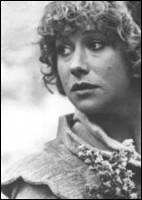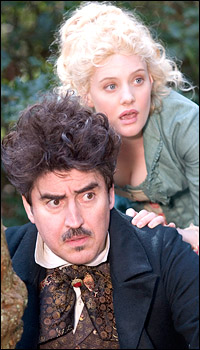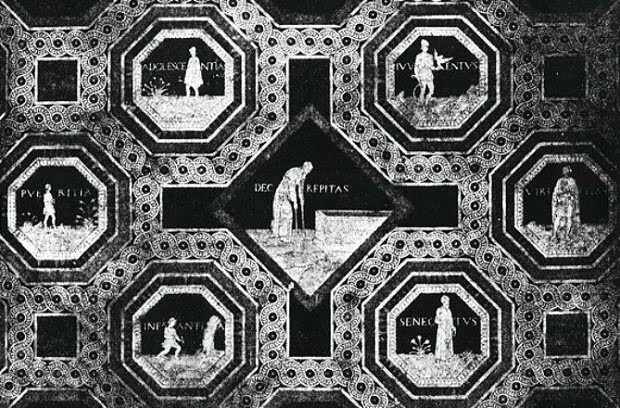Dr. Michael Delahoyde
Washington State University
AS YOU LIKE IT
ACT II
SCENE i
Duke Senior waxes eloquent about the pastoral life, realistically
acknowledging the wind and cold too:
Now, my co-mates and brothers in exile,
Hath not old custom made this life more sweet
Than that of painted pomp? Are not these woods
More free from peril than the envious court?
Here feel we not the penalty of Adam,
The seasons' difference, as the icy fang
And churlish chiding of the winter's wind,
Which when it bites and blows upon my body
Even till I shrink with cold, I smile and say,
"This is no flattery: these are cousellors
That feelingly persuade me what I am."
Sweet are the uses of adversity,
Which like the toad, ugly and venomous,
Wears yet a precious jewel in his head;
And this our life, exempt from public haunt,
Find tongues in trees, books in the running brooks,
Sermons in stones, and good in every thing.
(II.i.1-17)
The "penalty of Adam" (II.i.5), according to Genesis 3:19, may have
been work, but the Duke seems to be referring to the change of the
seasons, and one wonders if Shakespeare intended something more
general such as his ubiquitous theme of banishment (involving one's
being made subject to the harsh elements). The "winter's wind"
(II.i.7) might be rendered "Eos d'hiver."
One lord, Amiens, praises him for being able to "translate the
stubbornness of fortune / Into so quiet and so sweet a style"
(II.i.19-20). But Duke Senior is also demonstrating the process
of projection: his ability to see sermons in stones (like Orlando's
putting tongues in trees later) and Nature as full of moral exempla
is due to his own outlook (Farber 444). Duke Senior even laments
their killing the deer:
And yet it irks me the poor dappled fools,
Being native burghers of this desert city,
Should in their own confines with forked heads
Have their round haunches gor'd.
(II.i.22-25)
One of his companions tells him that the melancholy Jaques is similarly
sensitive about wildlife and "swears you do more usurp / Than doth your
brother that hath banish'd you" (II.i.27-28). Jaques witnessed a wounded
stag that was groaning and crying. The Duke asks, "Did he not moralize
this spectacle?" and is told, "O yes, into a thousand similes" (II.i.44-45).
Jaques sounds like a Euphuist. He has declared humans "mere usurpers,
tyrants, and what's worse, / To fright the animals and to kill them up
/ In their assign'd and native dwelling-place" (II.i.61-63). The Duke
looks forward to conversing with Jaques for a lark: "I love to cope him
in these sullen fits, / For then he's full of matter" (II.i.67-68).
Regarding Jaques, forget Cousteau; this name is supposed to have been
pronounced either "Jay-kweez" or maybe "Jakes," the latter an Elizabethan
term for 'privy' or 'toilet.' However, I doubt the long a. Wouldn't
the name more likely be pronounced "Jox"? (= Iox, or I, Ox.) In any case,
George Sand was so taken with the character that she made him central to
her French adaptation of this play (Ogburn and Ogburn 457).
One way of taking Jaques is to think of him as a picture, duly
attenuated, of what Shakespeare himself might have become if he had let
experience sour or embitter him, let his critical powers get the better
of his imagination. As traveler-libertine Jaques has had his day. Now he
would turn spectator-cynic and revenge himself on a world that can no
longer afford him pleasure, by proving it foul and infected. (Goddard,
I 283)
Melancholy, as a fashionable affectation, may have been "a mark of
aesthetic and intellectual refinement" (Farber 446), but does this
apply to Jaques in this play? It might be more productive to think
of the manic and depressive sides of Oxford manifested into another
"two gentlemen": the chatty Touchstone and the melancholy Jaques.
The "pastoral" fad began in the Renaissance when court political life was
seen to have grown exponentially more vicious and continued for a few
centuries. It romanticized the country life of the low-born, mostly
shepherds. One facet of the sentiment(ality) is featured in the famous
poem "The Passionate Shepherd to his Love" by Christopher Marlowe -- that
"Come live with me and be my love" poem answered with deflating realism
by "Ignoto" (usually identified as Walter Raleigh) and others since.
Marie Antoinette played shepherdess, but then she had lots of money to
invest in simplicity. Samuel Johnson thought it all idiotic. There may
be no direct parallel these days, but consider the simplicity movement
-- the rejection of technology and the exodus of software developers
in Silicon Valley to remote Idaho. Consider "wilderness movement"
ludicrousness. It's all pretty privileged.
George Puttenham in The Arte of English Poesie claimed that the
purpose of pastoral poetry was "not of purpose to counterfeit or represent
the rusticall manner of loves and communication: but under the vaile of
homely persons, and in rude speeches to insinuate and glaunce at greater
matters, and such as perchance had not been safe to have been disclosed
in any other sort" (qtd. in Farber 438).
SCENE ii
Duke Frederick discovers that his daughter and niece have fled. He suspects
they were aided by other court members, the paranoid jackass. A lord reports
the fool missing too. A gentlewoman overheard the cousins speaking fondly
of that wrestler who bested Charles, so that guy's probably in on this too.
Frederick sends for either Oliver or Orlando.
SCENE iii
Adam praises Orlando's virtues but has bad news. He reports to Orlando
that Oliver is on the warpath, planning arson and murder. Orlando is
reluctant to turn to beggary or thievery as a profession. Adam says he's
saved 500 crowns over his many years of service -- age 17 to now close to
80 -- as retirement funds. "He that doth the ravens feed, / Yea,
providently caters for the sparrow, / Be comfort to my age!"
(II.iii.43-45): God will provide. Orlando is appropriately impressed,
albeit with an old-fashioned feudal ideal:
O good old man, how well in thee appears
The constant service of the antique world,
When service sweat for duty, not for meed!
Thou art not for the fashion of these times,
Where none will sweat but for promotion,
And having that do choke their service up
Even with the having. It is not so with thee.
(II.iii.56-62)
They will flee to the forest. [Some Oxfordians detect in Adam reflections
of de Vere's longtime servant Churchyard, born in 1520 (Ogburn and Ogburn
455-456).]
Essentially through Act I and the start of II we're just going through
some excuses to get everyone into the woods, a setting that "dissolves
hierarchies" (Bloom 203) so that we can explore issues on a level
playing-field, or with the distance and perspective Theseus remarks
about in Act IV of A Midsummer Night's Dream. Generally, though,
"The point of view of As You Like It is from the underside of
society, made up of women, exiles, outcasts, the poor, the eccentric,
and the low in status. From such a perspective, power usually seems
oppressive, and its possessors tyrants: both Duke Frederick and Oliver
fit the pattern" (French 111-112).
|
SCENE iv
There's an English Arden which orthodox critics are quick to point out
is located near Shakspere's Stratford. But Oxford owned a Warwickshire
estate on the Avon which included a chunk of this forest (Ogburn and
Ogburn 450). Though the the character names in the play are a mix of
English and French, the French Ardenne forest makes more geographical
sense because of other southern French references. But in any case, we
should probably suspend realistic geographical considerations: Arden
later is said to harbor both palm trees and lions. The name "Arden"
incorporates two paradises: Arcadia and Eden (Farber 440).
|

|

|
Rosalind, Celia, and Touchstone are exhausted from walking so far. They
overhear shepherds Corin and Silvius discussing Silvius' love for a
country lass, Phebe: "if thy love were ever like to mine-- / As sure I
think did never man love so-- / How many actions most ridiculous / Hast
thou been drawn to by thy fantasy? (II.iv.28-31). Silvius waxes
melodramatic about his love. His is the extreme loss of self,
characteristic of Petrarchan love. Touchstone mocks the extreme effects
on behavior, delivered nostalgically, but Rosalind finds it relevant:
"this shepherd's passion / Is much upon my fashion" (II.iv.60-61). Celia
brings things down to earth, advising that one of them ask if the
shepherds have any food they can purchase. Touchstone hails Corin,
announcing them as "Your betters, sir" (II.iv.68). Rosalind is more
admirable and polite, and "Nothing could show more succinctly Rosalind's
'democracy' in contrast to Touchstone's snobbery" (Goddard, I 286).
She presents herself as a man and Celia as "a young maid with travel much
oppressed," close to fainting (II.iv.74). Unfortunately, Corin has a
"churlish," ungenerous master (II.iv.80), and there's very little anyway.
Instead, Rosalind buys, through Corin, the cottage, pasture, and flock.
Celia is enthusiastic about this idea: "I like this place, / And
willingly could waste my time in it" (II.iv.94-95). So the deal will go
down. Again, the pastoral simple life requires cash and leisure. Do these
fugitives have any? Like the Earl of Oxford, there's not much thought
given to practicalities of cash-carrying.
|
SCENE v
Amiens sings a song: "Under the Greenwood Tree." Jaques seems absurd,
despising the pastoral songs of Amiens but demanding and begging for
more. He enjoys being melancholy and his own negatively critical railing:
"I can suck melancholy out of a song, as a weasel sucks eggs"
(II.v.12-13). He's a tamer version of Thersites in Troilus and
Cressida, but an artist in his own medium. Jaques renders a stanza
of the song, using a filler nonsense word, "Ducdame," which he translates
as "a Greek invocation, to call fools into a circle" (II.v.59-60), but
which may just mean "damn Duke" (Clark 524). "Ducdame" also may invoke
"Duke Dame," or Lady Duke, that is, woman sovereign (Ogburn and Ogburn
459). And it may be an intentional mispronunciation of "Douce Dame" --
a phrase from Old French love songs and title of a Guillaume de Machaut
motet. Jaques continues: "I'll go sleep, if I can; if I cannot, I'll rail
against all the first-born of Egypt" (II.v.59-60). Oxford's insomnia is
referenced here, as is his artistry in railing. And the first-born of
Egypt, a.k.a. Gypsies, were also known as Moone-men (because of their
wandering).
SCENE vi
Adam is exhausted from the long forest trek, so Orlando will press on
and try to find some sustenance.
SCENE vii
Duke Senior cannot find Jaques: "I think he be transformed into a
beast, / For I can nowhere find him like a man" (II.vii.1-2) --
recalling the Actaeon myth. But Jaques appears, reporting to the Duke
that he encountered "A fool, a fool! I met a fool i' th' forest, / A
motley fool ... / Who laid him down and basked him in the sun, / And
railed on Lady Fortune in good terms" (II.vii.12-16). Jaques is so taken
with Touchstone's shtick about time -- "And so from hour we ripe and ripe,
/ And then from hour to hour we rot and rot" (II.vii.26-27), wording
which recalls "Ignoto's" reply to Marlowe's "Come Live With Me" -- and
Touchstone's other observational wit that first he "began to crow like
chanticleer" (II.vii.30) and now almost has had a calling to the profession:
"O that I were a fool! / I am ambitious for a motley coat" (II.vii.42-43).
His calling for this "suit" may represent Oxford's hope for the liberty
to write the truth (Ogburn and Ogburn 460). Both Touchstone and Jaques
seem to be the closest representatives of the playwright (Ogburn and Ogburn
443), perhaps the manic and depressive sides, respectively, but each side
an artist. Jaques claims he can do some good with his railing or his
biting perspective this way:
The wise man's folly is anatomiz'd
Even by the squand'ring glances of the fool.
Invest me in my motley; give me leave
To speak my mind, and I will through and through
Cleanse the foul body of th' infected world,
If they will patiently receive my medicine.
(II.vii.56-61)
Thus "he tries to rationalize his misanthropy" (Goddard, I 283).
After all, it might be said that Jaques "met a Touchstone pretending to
be Jaques" (Farber 448). In any case, railing is his idea of entertainment.
The Duke rebukes him: "Most mischievous foul sin, in chiding sin: / For
thou thyself hast been a libertine, / As sensual as the brutish sting
itself" (II.vii.64-66). But Jaques defends himself in the role.
Orlando enters threateningly demanding food: "Forbear, and eat no more"
(II.vii.88). It's silly, because no one here is denying him any, so he
apologizes for the assumption that because they are in the wilderness he
assumed he had to act savagely: "'masculine' forms are not acceptable or
necessary here. To get food, one need merely ask. Arden is a feminine
world" (French 112). And Orlando here "finds that the wilderness is more
civilized than he is" (Farber 445).
When the Duke ponders the plights of more than himself and uses a
theatrical metaphor, it triggers the famous speech from the dismal
Jaques:
All the world's a stage,
And all the men and women merely players;
They have their exits and their entrances,
And one man in his time plays many parts,
His acts being seven ages.
(II.vii.139ff)
This is a famous bit for the merchandizing of Shakespeare, but Jaques is
being rather pretentious and contrived. Orthodox critics who accept the
late composition date of this play are apt to insist that the speech was
already a cliché by this time (e.g., Farber 450). It's a speech "he
must have rehearsed more times than the modern schoolboy who declaims it"
(Goddard, I 285). What follows is his run-down of the Seven Ages of
Man, all pretty miserable as he tells it (though with attention to the
progression of speech), with infants "Mewling and puking" (okay, he's
right-on about that), schoolkids hating school, lovers being idiots,
soldiers being morons, middle-aged justices being self-indulgent, older
men turning into dorks, and the very old losing teeth, sight, and
everything.
To belie this vision, Adam is immediately trotted on stage, an honorable
and venerable old man, "a living refutation of his [Jaques'] picture of
old age" (Goddard, I 285). "Arden is not ... the realm of nature,
but the realm of the emotional" (French 116). The Duke requests some music,
so Amiens sings "Blow, Blow, Thou Winter Wind," a wistful complaint favoring
foul weather conditions over court politics and again suggesting "Eos
d'hiver." "Hey-ho, sing hey-ho, unto the green holly. / Most friendship
is feigning, most loving mere folly" (II.vii.181-182). The Duke assures
the newcomers that he and the late Sir Rowland were good friends.

This is a depiction of the Seven Ages in the tile flooring of the Siena
Cathedral, no doubt described to Shakspere in a London tavern by a
gin-swilling art-enthusiast mariner.
For discussion of sources for the idea of The Seven Ages of Man, see the
article by Christopher Paul, "This Strange Eventful History: Oxford,
Shakespeare, and The Seven Ages of Man." The Shakespeare Oxford
Newsletter 38.3 (Summer 2002): 1, 12-15, 24.
Act III
Shakespeare Index


